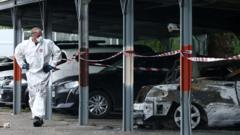Following a series of violent incidents targeting French prisons, authorities are investigating the involvement of drug gangs in the attacks. Interior Minister Bruno Retailleau has suggested that these gangs are retaliating against the government's intensified efforts to combat drug trafficking, leading to fears for the safety of prison staff and security personnel.
French Prisons Under Siege: The Suspected Role of Drug Gangs in Recent Violence

French Prisons Under Siege: The Suspected Role of Drug Gangs in Recent Violence
A spate of attacks on French jails has raised questions about the involvement of drug gangs amidst a backdrop of government crackdowns on drug trafficking.
French prisons have found themselves the center of violent attacks, sparking fears and prompting inquiries about who is orchestrating these violent acts. Since Sunday night, at least 12 incidents of arson and gunfire have plagued various penitentiaries, leading officials to consider multiple potential culprits, including extreme leftist groups or foreign entities. However, an increasing consensus indicates that these attacks may be retaliation from drug gangs reacting to a significant government crackdown on drug-related crimes.
Interior Minister Bruno Retailleau has expressed confidence that the violent episodes are indeed a backlash from groups involved in drug trafficking, labeling them as “drugs-yobs” in French. The minister emphasized that the government's latest legislation on drug offenses—intended to severely impact drug traffickers' operations—has indeed declared a war against these gangs, leading them to retaliate by targeting prison facilities.
These coordinated attacks involve setting fire to vehicles outside of prisons and a training center for prison officers, with firearms also being deployed in some instances. The perpetrators have left their mark by tagging graffiti associated with a yet-to-be-known group called Droits des Prisonniers Français (DDPF), which claims to advocate for the rights of inmates.
While the DDPF appears uncharacteristic for a traditional drug gang—often lacking the intellectual framework of far-left organizations—it aligns more closely with the raw tactics typically employed by drug traffickers. Investigations suggest that those captured on video during the attacks resemble typical foot soldiers rather than ideologically driven militants, raising doubts about the narrative that this group may represent a genuine leftist revolt.
Amidst speculations of foreign interference, particularly with tensions high between France and Algeria, the French government maintains focus on the drug gang hypothesis. The unified political stance of the interior and justice ministers bolsters their commitment to combating the drug crisis, making implications that they are indeed under threat. To further the initiative, a new parliamentary bill aims to curb the operational capacity of drug lords, establishing specialized prosecutor divisions and secure detention facilities for the most dangerous offenders.
Public safety concerns have intensified following incidents like the escape of a notorious drug lord, which involved tragic consequences for prison officers. The government's assertion that recent prison attacks signal an intimidation of drug gangs allows them to portray their approach as effective to the electorate. Voter confidence may hinge on the timely capture of those responsible for the attacks, providing a clear narrative of reclaiming control in the face of adversity within the prison system.



















